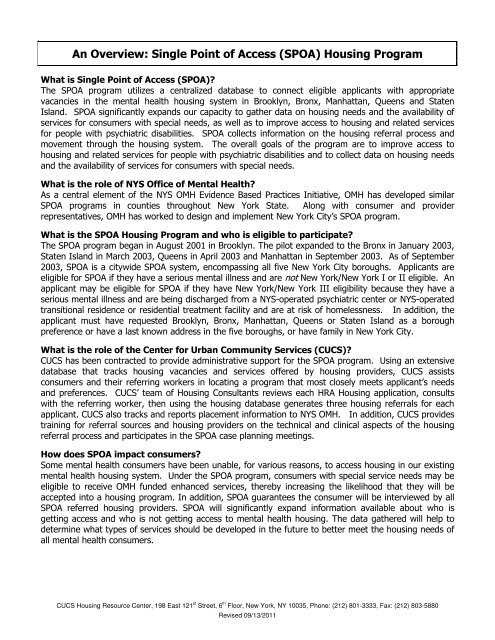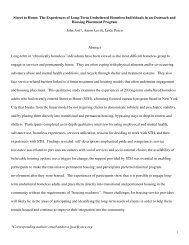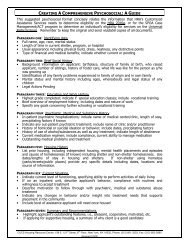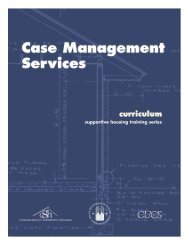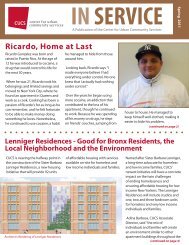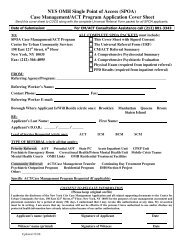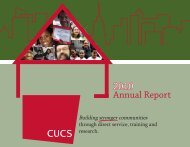An Overview: Single Point of Access (SPOA) Housing Program - cidny
An Overview: Single Point of Access (SPOA) Housing Program - cidny
An Overview: Single Point of Access (SPOA) Housing Program - cidny
Create successful ePaper yourself
Turn your PDF publications into a flip-book with our unique Google optimized e-Paper software.
<strong>An</strong> <strong>Overview</strong>: <strong>Single</strong> <strong>Point</strong> <strong>of</strong> <strong>Access</strong> (<strong>SPOA</strong>) <strong>Housing</strong> <strong>Program</strong><br />
What is <strong>Single</strong> <strong>Point</strong> <strong>of</strong> <strong>Access</strong> (<strong>SPOA</strong>)?<br />
The <strong>SPOA</strong> program utilizes a centralized database to connect eligible applicants with appropriate<br />
vacancies in the mental health housing system in Brooklyn, Bronx, Manhattan, Queens and Staten<br />
Island. <strong>SPOA</strong> significantly expands our capacity to gather data on housing needs and the availability <strong>of</strong><br />
services for consumers with special needs, as well as to improve access to housing and related services<br />
for people with psychiatric disabilities. <strong>SPOA</strong> collects information on the housing referral process and<br />
movement through the housing system. The overall goals <strong>of</strong> the program are to improve access to<br />
housing and related services for people with psychiatric disabilities and to collect data on housing needs<br />
and the availability <strong>of</strong> services for consumers with special needs.<br />
What is the role <strong>of</strong> NYS Office <strong>of</strong> Mental Health?<br />
As a central element <strong>of</strong> the NYS OMH Evidence Based Practices Initiative, OMH has developed similar<br />
<strong>SPOA</strong> programs in counties throughout New York State. Along with consumer and provider<br />
representatives, OMH has worked to design and implement New York City’s <strong>SPOA</strong> program.<br />
What is the <strong>SPOA</strong> <strong>Housing</strong> <strong>Program</strong> and who is eligible to participate?<br />
The <strong>SPOA</strong> program began in August 2001 in Brooklyn. The pilot expanded to the Bronx in January 2003,<br />
Staten Island in March 2003, Queens in April 2003 and Manhattan in September 2003. As <strong>of</strong> September<br />
2003, <strong>SPOA</strong> is a citywide <strong>SPOA</strong> system, encompassing all five New York City boroughs. Applicants are<br />
eligible for <strong>SPOA</strong> if they have a serious mental illness and are not New York/New York I or II eligible. <strong>An</strong><br />
applicant may be eligible for <strong>SPOA</strong> if they have New York/New York III eligibility because they have a<br />
serious mental illness and are being discharged from a NYS-operated psychiatric center or NYS-operated<br />
transitional residence or residential treatment facility and are at risk <strong>of</strong> homelessness. In addition, the<br />
applicant must have requested Brooklyn, Bronx, Manhattan, Queens or Staten Island as a borough<br />
preference or have a last known address in the five boroughs, or have family in New York City.<br />
What is the role <strong>of</strong> the Center for Urban Community Services (CUCS)?<br />
CUCS has been contracted to provide administrative support for the <strong>SPOA</strong> program. Using an extensive<br />
database that tracks housing vacancies and services <strong>of</strong>fered by housing providers, CUCS assists<br />
consumers and their referring workers in locating a program that most closely meets applicant’s needs<br />
and preferences. CUCS’ team <strong>of</strong> <strong>Housing</strong> Consultants reviews each HRA <strong>Housing</strong> application, consults<br />
with the referring worker, then using the housing database generates three housing referrals for each<br />
applicant. CUCS also tracks and reports placement information to NYS OMH. In addition, CUCS provides<br />
training for referral sources and housing providers on the technical and clinical aspects <strong>of</strong> the housing<br />
referral process and participates in the <strong>SPOA</strong> case planning meetings.<br />
How does <strong>SPOA</strong> impact consumers?<br />
Some mental health consumers have been unable, for various reasons, to access housing in our existing<br />
mental health housing system. Under the <strong>SPOA</strong> program, consumers with special service needs may be<br />
eligible to receive OMH funded enhanced services, thereby increasing the likelihood that they will be<br />
accepted into a housing program. In addition, <strong>SPOA</strong> guarantees the consumer will be interviewed by all<br />
<strong>SPOA</strong> referred housing providers. <strong>SPOA</strong> will significantly expand information available about who is<br />
getting access and who is not getting access to mental health housing. The data gathered will help to<br />
determine what types <strong>of</strong> services should be developed in the future to better meet the housing needs <strong>of</strong><br />
all mental health consumers.<br />
CUCS <strong>Housing</strong> Resource Center, 198 East 121 st Street, 6 th Floor, New York, NY 10035, Phone: (212) 801-3333, Fax: (212) 803-5880<br />
Revised 09/13/2011
How does <strong>SPOA</strong> impact housing providers?<br />
<strong>Housing</strong> providers interview all applicants with complete HRA <strong>Housing</strong> Application packets that have<br />
been referred by <strong>SPOA</strong>. Providers will continue to assess and accept/reject applicants using their own<br />
agency criteria. <strong>Housing</strong> providers will have the opportunity to request enhanced services for a period <strong>of</strong><br />
time as a condition <strong>of</strong> accepting an applicant. In cases where all three providers decline an application,<br />
CUCS will notify the providers and referral source <strong>of</strong> the date <strong>of</strong> the next <strong>SPOA</strong> case planning meeting.<br />
How does <strong>SPOA</strong> impact referral sources?<br />
Referral sources continue to have the ability to request a specific residence or make referrals outside the<br />
<strong>SPOA</strong> process. For individuals who are eligible for the <strong>Single</strong> <strong>Point</strong> <strong>of</strong> <strong>Access</strong> <strong>Program</strong>, referral sources<br />
submit the HRA <strong>Housing</strong> Application packet to both HRA/OHMHS (NYC Human Resources<br />
Administration/Office <strong>of</strong> Health and Mental Health Services) and to CUCS. Referral sources have access<br />
to CUCS housing consultants, who consult on the case, <strong>of</strong>fer any necessary technical assistance and<br />
provide three referrals upon receipt <strong>of</strong> the approval letter from the referring worker. The process <strong>of</strong><br />
determining which housing programs best match an applicant’s needs is collaborative and incorporates<br />
consumer preferences and referral source recommendations. In most cases, the applicant receives three<br />
referrals to housing providers and is guaranteed three interviews. By centralizing and standardizing the<br />
process, <strong>SPOA</strong> is intended to make referrals more efficient and expedient. In addition, <strong>SPOA</strong> <strong>of</strong>fers<br />
enhanced services to facilitate access to housing for people that present extensive needs.<br />
What types <strong>of</strong> enhanced services are available?<br />
In order to accommodate the diverse needs <strong>of</strong> consumers, OMH has not developed a pre-set menu <strong>of</strong><br />
enhanced services. OMH is willing to consider funding any reasonable request for a service that would<br />
help a consumer succeed in housing. Examples <strong>of</strong> enhanced services that can be requested include, but<br />
are not limited to, bridger case management and temporary additional staffing. All requests for<br />
enhanced services will be reviewed and approved/rejected by OMH. All funding for enhanced services<br />
will be connected to the consumer, so that funding will be discontinued if the consumer leaves the<br />
program or no longer requires the service.<br />
What is the purpose <strong>of</strong> and who attends <strong>SPOA</strong> case planning meetings?<br />
In cases where an applicant is rejected after an interview by all three housing providers, the Referral<br />
Source may request a case planning meeting by notifying CUCS. CUCS coordinates the date for the case<br />
planning meeting with those who will be present at case planning meetings, including: an OMH<br />
representative, representatives from each <strong>of</strong> the three housing provider agencies that received referrals,<br />
CUCS representatives, and when applicable, representatives from other agencies available to provide<br />
services. The consumer and a representative <strong>of</strong> the referring agency are strongly encouraged to<br />
participate. When necessary, a conference call can be arranged to facilitate consumer/referral source<br />
participation. The case planning meeting may result in any <strong>of</strong> the following: an approval for enhanced<br />
services resulting in housing placement, a decision to generate new referrals to housing programs, or<br />
the development <strong>of</strong> an alternative service plan.<br />
CUCS <strong>Housing</strong> Resource Center, 198 East 121 st Street, 6 th Floor, New York, NY 10035, Phone: (212) 801-3333, Fax: (212) 803-5880<br />
Revised 09/13/2011


